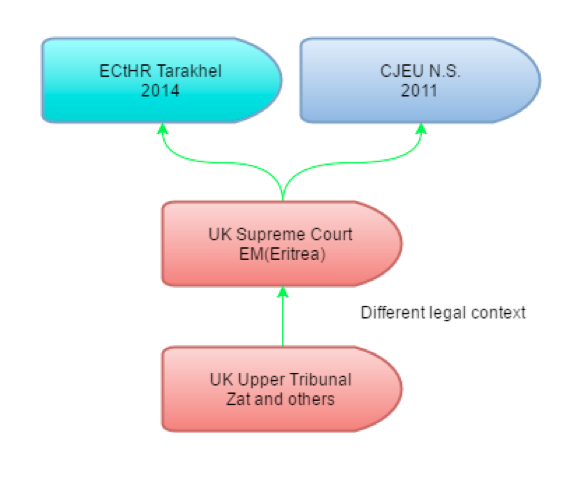United Kingdom, Upper Tribunal, ZAT and others case, judgement of
Interaction between Article 8 ECHR with Article 24 Charter via CJEU preliminary ruling in MA – UK Upper Tribunal creative use of consistent interpretation to preserve both the right to family life and Dublin III based reunification procedure
The UK Upper Tribunal had to decide whether the UK immigration office’s refusal to admit the first four applicants swiftly to the UK, in circumstances falling outside the formal application of the Dublin III Regulation mechanisms, amounted to a disproportionate interference with their rights under Article 8 ECHR.
The case involves three unaccompanied minors and a dependent adult brother suffering of severe mental disorder who resided in a French camp in Calais, also known as ‘the Jungle’. They sought to enter the UK for the purpose to reunite with their siblings, who were recognised refugee status there. Since they did not formally apply for asylum while in France they could not rely on reunification under Article 8 Dublin III Regulation but they application was primarily based on Article 8 ECHR positive obligations on the State to ensure family life to those under their jurisdiction. They refused to apply for asylum in France due to the lengthy French procedure for considering family reunification under Dublin III Regulation.

Interaction between Article 8 ECHR with Article 24 Charter via CJEU preliminary ruling in MA. The UK Upper Tribunal creatively uses consistent interpretation to preserve both the right to family life and Dublin III based reunification procedure.
- Article 7 - Respect for private and family life
- Article 24 - The rights of the child
Role of the Article 24 of the Charter:
The application of Article 24 of the Charter in Dublin transfers of unaccompanied minors is implicitly accepted by way of invoking the CJEU conclusions in the MA preliminary ruling. Since family reunification is the central legal issue, Article 8 of the Convention is prioritised. Mention is made of Article 7 CFR as a subsidiary point in the applicant’s submissions but is never elaborated upon. The judgment is decided on the basis of Article 8 ECHR.
- Article 8 - Right to respect for private and family life
- Case C-411/10, N.S. and others, ECLI:EU:C:2011:865
- Case C-394/12, Shamso Abdullahi v Bundesasylamt, ECLI:EU:C:2013:813
- UK Supreme Court EM (Eritrea) [2014] AC 1321
Relevant Judicial Dialogue Techniques

